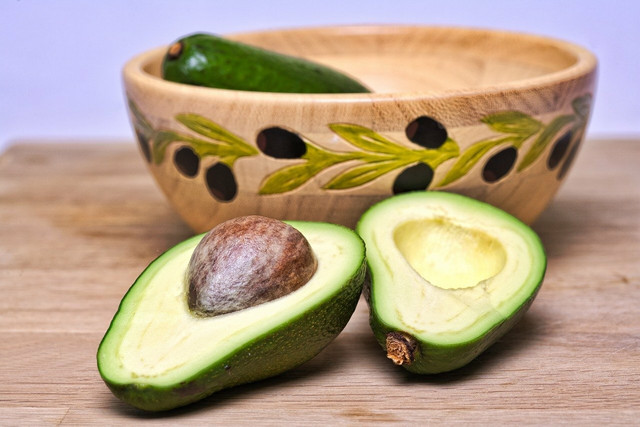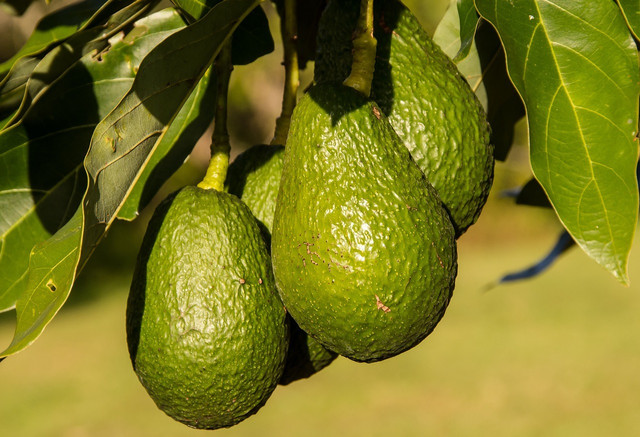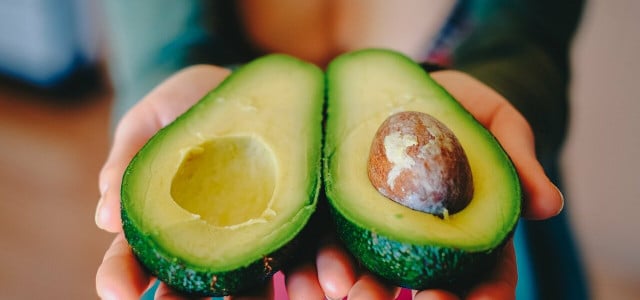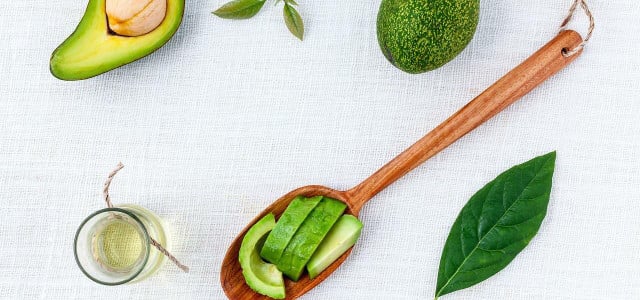Avocados are well-known for their great flavor, but did you know that avocado oil benefits your skin? In this article, we’ll discuss the benefits and potential drawbacks of avocado oil for skincare, as well as its environmental impact.
What Exactly Is Avocado Oil?

(Foto: CC0 / Pixabay / GerDukes)
Avocado oil is made from the seed of the avocado rather than the fruit itself. Avocado oil benefits skin plentiful thanks to its hydrating, relaxing, and anti-inflammatory properties when applied directly to the face or body. This makes it ideal for people of varying kinds of complexions.
Avocados contain an all-encompassing concentration of compounds and nutrients that are of great use to us. Here’s a quick list of the substances that can be found within a single avocado.
- Vitamins A, B, C, D, and E
- Omega-3 Fatty Acids – these help the skin retain its smoothness and produce collagen.
- Minerals such as Potassium
- Sterolic acid – an acid that naturally moisturizes the skin
- Oleic Acid, Beta Carotene, and Protein – also enhance skin collagen production.
- Lecithin – aids the heating and cooling of the skin, therefore aiding UV protection against sun damage.
With such an outstanding concentration of vitamins, fatty acids, and other replenishing nutrients, avocado oil has great potential for applications in the cosmetic sector.
Avocado Oil’s Benefits and Drawbacks for the Skin
Here are a few of the most famous benefits of avocado oil:
- Hydrates and Moisturizes Skin – Natural fatty acids in avocados, as well as vitamins A, D, and E, help to hydrate and nourish the skin. These components work together to preserve your skin’s water permeability.
- May Aid in the Treatment of Eczema and Psoriasis – Eczema sufferers will be pleased to know about this avocado oil benefit. Thanks to its anti-inflammatory properties avocado oil may help ease irritation when applied to affected areas. Studies suggest that other conditions such as psoriasis may also be combated.
- May Be Used to Treat Acne – Avocado oil anti-inflammatory substances that may help keep your skin smooth and prevent acne.
- May Reduce Wrinkles – Avocado oil’s high quantities of oleic acid, beta carotene, and protein have long been associated with increased skin collagen production, which keeps our skin appearing youthful and staves of signs of aging.
- Speeds up Wound Healing – Avocado oil’s monosaturated fatty acids, such as linoleic and oleic acids, have been demonstrated in studies to hasten wound healing.
- Used to Treat Dandruff and Itchy Scalps – The high concentration of Vitamins B and E within avocado oil is said to enter the scalp’s deep layer and restore it with moisturization.
Tip: Before purchasing avocado oil products, check the beginning of the ingredient list. Ensure the avocado content is significant enough to have an impact on the recipe, as ingredients are ranked based on volume. We at Utopia recommend buying natural cosmetics with reputable certifications like EWG and leaping bunny.
Avacodo Oil Side-Effects
There has not been much research on avocado oil’s side effects. But it’s commonly known that when avocado oil is applied topically, it might trigger skin allergies in some individuals, leading to itching and other symptoms of irritation. Some people have a rash that is red all over their body, including their face and arms.
- A patch test is always a good idea before using any new product to make sure there aren’t any unexpected side effects. Rub a little amount of oil into the inside of your forearm to do this. If you don’t suffer any irritation or inflammation within 24 hours, you should be able to enjoy the oil without any concerns.
- Start with an avocado oil-based cream or serum if you already have sensitive skin or are hesitant to pour on pure avocado oil.
How to Use Avocado Oil to Care For Your Skin
There are a number of ways in which you can reap the avocado oil benefits for skin and hair in your daily routine. We’ve outlined a few of the simplest and most common methods of application below.
For Face
- Mix the oil with your moisturizer on the palm of your hand and apply the mixture after showering.
- Use a few drops in a face mask or a make-your-own mask.
For Body
- If you’re using a body moisturizer, add 5-6 drops of pure avocado oil. Thoroughly combine before applying the lotion.
- Avocado oil in a warm bath provides luxurious all-over body moisturization.
For Hair
- Massage avocado oil into your scalp and hair with your fingers.
- After showering, combine a few drops of avocado oil with your conditioner. Avoid over-oiling.
- Applying avocado oil to your hair before bedtime will help it shine. Wear it at night and wash it off in the morning.
The Avocado Oil Buyer’s Guide



(Foto: CC0 / Pixabay / sandid)
Luckily, you don’t have to go far if you want your skin to benefit from avocado oil’s many advantages. You can purchase the oil in an organic food shop or a network of health stores. However, one question remains, how does one know what they’re really buying?
You may see avocado oil marketed under a variety of various names at health food or beauty supply shops. Here’s a breakdown of what each one means:
- Pure – If an oil is labeled as “pure,” it signifies it has not been tainted in any way. There are no diluents in these products. As a result, the oil was produced entirely from avocado seeds.
- Organic – Organic avocado oil is made from fruit that hasn’t been treated with pesticides or fertilizers of any kind. We strongly recommend buying this variety, to support ecological agriculture.
- Cold-pressed – Cold pressing releases the oil’s nutrients by compressing the fruit under increased pressure and at temperatures below 35°C. While sterilizing the raw material, all of its beneficial components are retained.
- Unrefined – Refined oil has been subjected to chemical processes such as bleaching or deodorization before being sold. This can change the product’s natural color and fragrance. Unprocessed oil retains all of the healthy fatty acids and vitamins. Because of the filtering procedure, there are no pollutants left.
Final Thoughts on Avocado Oil and Its Benefits
In terms of sustainability, buying organic avocado oil produced in the US is your best option as it will limit your carbon footprint. Luckily, there are a few states that grow avocados, including California, Florida, and Hawaii. An example of an organic, USA-produced avocado oil brand includes US Organic’s 100% Pure Avocado Oil, which is available to purchase at US Organic’s website.
However, we at Utopia.org advise strongly to eat avocado (and use its products) in moderation only if at all, because of the many environmental issues connected to it.
Avocados are farmed all year and mature at various times. Despite this, each seasonal avocado has a significant environmental effect. Long chilled container shipping routes cause high CO2 emissions. Environmental groups in Mexico have protested illicit deforestation to make way for crops. Irrigation is another issue. Growing one avocado needs 60 gallons of water – in hot, arid climates where water scarcity is widespread. You’ll find more information on the issue in our article “Avocado Benefits: How Healthy is this Problematic Superfood?“
If you’re looking for a more sustainable option when it comes to skincare, we suggest using rosehip oil instead. As always it’s better that you buy regional products that are completely organic.
Read more:
- Avocado Benefits: How Healthy is this Problematic Superfood?
- How to Grow Your Own Avocado Tree
- 9 Coconut Oil Health Benefits You Need to Know
Do you like this post?









